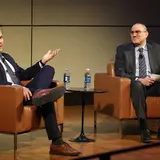
CNN’s Nic Robertson Discusses Journalism and Global Democracy
Robertson, CNN’s international diplomatic editor, spoke at the Yale School of Management on February 24 as part of the Poynter Fellowship in Journalism lecture series.
By Karen Guzman
Journalism is facing credibility issues and an eroding public reputation, but it plays a critical role in the health of democracies and must be preserved, CNN’s Nic Robertson told an audience at the Yale School of Management.
“Journalists are a vital part of a democracy who provide important, impartial information that is relevant in our lives,” Robertson said.
Robertson, the international diplomatic editor at CNN, spoke at Yale SOM on February 24, as part of the Poynter Fellowship in Journalism lecture series. Robertson’s talk was titled “Surviving Warzones: Life on the Front Line of History, the Murderers, the Madness, and Making Sense of it All.” The conversation was moderated by Zoë Chance, a lecturer in management.
During 30 years with CNN, Robertson has reported on some of the biggest stories in the world, covering global terrorism and armed conflict in Syria, Iraq, and Afghanistan; terrorist attacks in the UK and Norway; and disasters in New Orleans and Italy. He is the recipient of two Peabody Awards, several Emmy Awards, and the Prix Bayeux TV War Correspondent of the Year award.
Robrtson and his CNN team also recently won the Royal Television Society Journalism 2020 Awards for Breaking News for their coverage of Hong Kong protesters storming the Legislative Council. He previously won the same award in 2002, for coverage of the al Qaeda training tapes; and in 2001, for innovation.
At Yale SOM, Robertson discussed the challenges of reporting from global hot spots, the changing nature of media, and his own career trajectory.
Asked by an audience member to identify a story from the past 10 years that he believes has been underreported, and that will have major repercussions on the global stage, he pointed to the civil war that erupted in Libya in 2014. “The fact that Russia and Turkey are deeply engaged in Libya is very troubling for the Arab Gulf states, in particular,” he said.
Looking ahead, Robertson said that one story that will dominate future headlines “has to be the U.S./China relationship,” he said. Noting troubling accounts of China-produced technology that spies on Western users, asking, “Who can we trust in the future? Which path do we go down? Are we really going down a binary path again? And how does Russia figure into this?…Putin is not going away.”
His time in unstable, war-torn, and authoritarian regimes has convinced Robertson of the value of democracies and the need to preserve them. Healthy democracies, where there is a free exchange of ideas and information, are an antidote to some of the world’s problems.
“We have something that took a long time to arrive at,” Robertson said. “If I have a role as a journalist to help in preserving that, I’m proud of that.”



